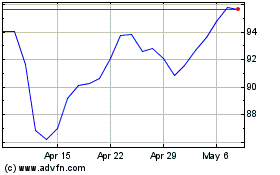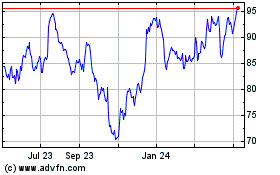By Julie Steinberg and Alec Macfarlane
HONG KONG--Two years ago, private-banking clients at Morgan
Stanley bought into Tianhe Chemicals Group, one of the hottest
initial public offerings in Hong Kong. Now some of them can't get
out.
Tianhe, a Chinese chemicals firm, has traded for only about
eight months since it went public with great fanfare in June 2014
in a $748 million IPO. The stock was suspended for more than a
month in late 2014 when an anonymous group accused it of accounting
fraud, an allegation the company denied. Trading was halted again
at the company's request in March 2015, when Tianhe said it
wouldn't be able to file 2014 earnings on time, and it has been
suspended ever since.
Tianhe joins nearly 50 other Hong Kong-listed companies, with a
collective market value worth an estimated HK$314.8 billion
(US$40.55 billion), whose shares have been suspended for three
months or more--the result of an unusual regulatory regime under
which companies stay suspended longer than in other major
markets.
Hong Kong doesn't have a specific delisting process for
companies with accounting irregularities or those that are
undergoing regulatory investigations. The process for other
reasons, such as severe financial difficulties, can be lengthy and
difficult, securities lawyers say.
In the U.S., the Securities and Exchange Commission can only
suspend companies that trade on an exchange for up to 10 days
before trading resumes automatically.
Hong Kong's system means investors can find their money frozen
for months or even years, while companies and regulators work out
problems, conduct investigations or go through the delisting
process. The Hong Kong stock exchange does have the power to delist
a company under certain circumstances.
Besides Tianhe, other high-profile companies whose shares have
been suspended for the long term include former highflying solar
firm Hanergy Thin Film Power Group Ltd., whose share surge early
last year temporarily made the company's founder China's richest
man, according to some estimates. The company requested a trading
halt in May 2015 after its share price plunged 47% in minutes, and
later became the subject of a regulatory probe.
Shares in another company, First Mobile Group, haven't traded
since November 2009.
Hong Kong's securities regulator in July ordered Hanergy to stay
suspended. A Hanergy spokesman said the company believes the
trading halt has harmed innocent investors and thinks the regulator
should let shares resume trading soon.
A spokeswoman for Tianhe said the company is "highly focused on
fulfilling" conditions that would enable it to resume trading.
Global banks have responded by facilitating off-market buying
and selling of frozen issues. But retail investors generally don't
have access to such services, while institutional investors such as
hedge funds say the frozen shares are tough to price.
There has been a "regulatory bias in favor of protecting those
who don't own the shares rather than those who do," said David
Webb, a shareholder activist in Hong Kong. "It would be fairer to
retail investors...if the stock is allowed to trade even if it is
on death's door."
A spokesman for Hong Kong Exchanges and Clearing Ltd., which
operates the stock exchange, said it "always seeks to meet its
obligation to maintain a fair, orderly and efficient securities
market." The exchange said in March it would "conduct a holistic
review of regulations" related to long-suspended companies. The
exchange has also been deliberating an amendment to rules that
would hasten the delisting process for certain companies, a person
familiar with the situation said.
Traders familiar with the process of trading frozen stocks say
banks match prospective buyers, such as hedge funds that have
shorted the stock and are looking to cover their short positions,
with sellers: funds that want the holding off their books because
it is too hard to value or because it might not resume trading. The
buyers and sellers tell their brokerages the price they are
requesting or offering, generally a fraction of the last traded
price, traders said.
One long-only fund sold seven million shares in Hanergy at 30
Hong Kong cents a share in March, a person familiar with the matter
said. Hanergy was trading at HK$3.91 when it was halted.
U.S.- based firm Guggenheim Partners LLC was able to unload
roughly 62 million shares in the third quarter of last year after
trading in the company was suspended. The fund sold the shares
mainly to short sellers in anticipation of the stock being removed
from indexes compiled by MSCI Inc., a person familiar with the
matter said.
Tianhe shares have meanwhile recently changed hands at 5 Hong
Kong cents a share, one person familiar with the matter said. That
compares with HK$1.17 when they were halted, HK$1.80 at the time of
the IPO and as high as HK$2.49 at their peak in August 2014.
Tianhe's stock can't trade again until it publishes its
outstanding results, a task made more difficult after the company's
auditor, Deloitte Touche Tohmatsu Ltd., resigned in September. The
company has a new auditor and said it is working to meet regulatory
requirements that would allow it to continue trading.
Morgan Stanley, which was one of the lead banks on Tianhe's IPO,
was also an early investor in the company through its
private-equity arm. A spokesman declined to comment on how Morgan
Stanley is valuing Tianhe, which has contributed to some accounting
losses in the firm's Asia private-equity portfolio.
Write to Julie Steinberg at julie.steinberg@wsj.com
(END) Dow Jones Newswires
May 18, 2016 05:14 ET (09:14 GMT)
Copyright (c) 2016 Dow Jones & Company, Inc.
Morgan Stanley (NYSE:MS)
Historical Stock Chart
From Mar 2024 to Apr 2024

Morgan Stanley (NYSE:MS)
Historical Stock Chart
From Apr 2023 to Apr 2024
